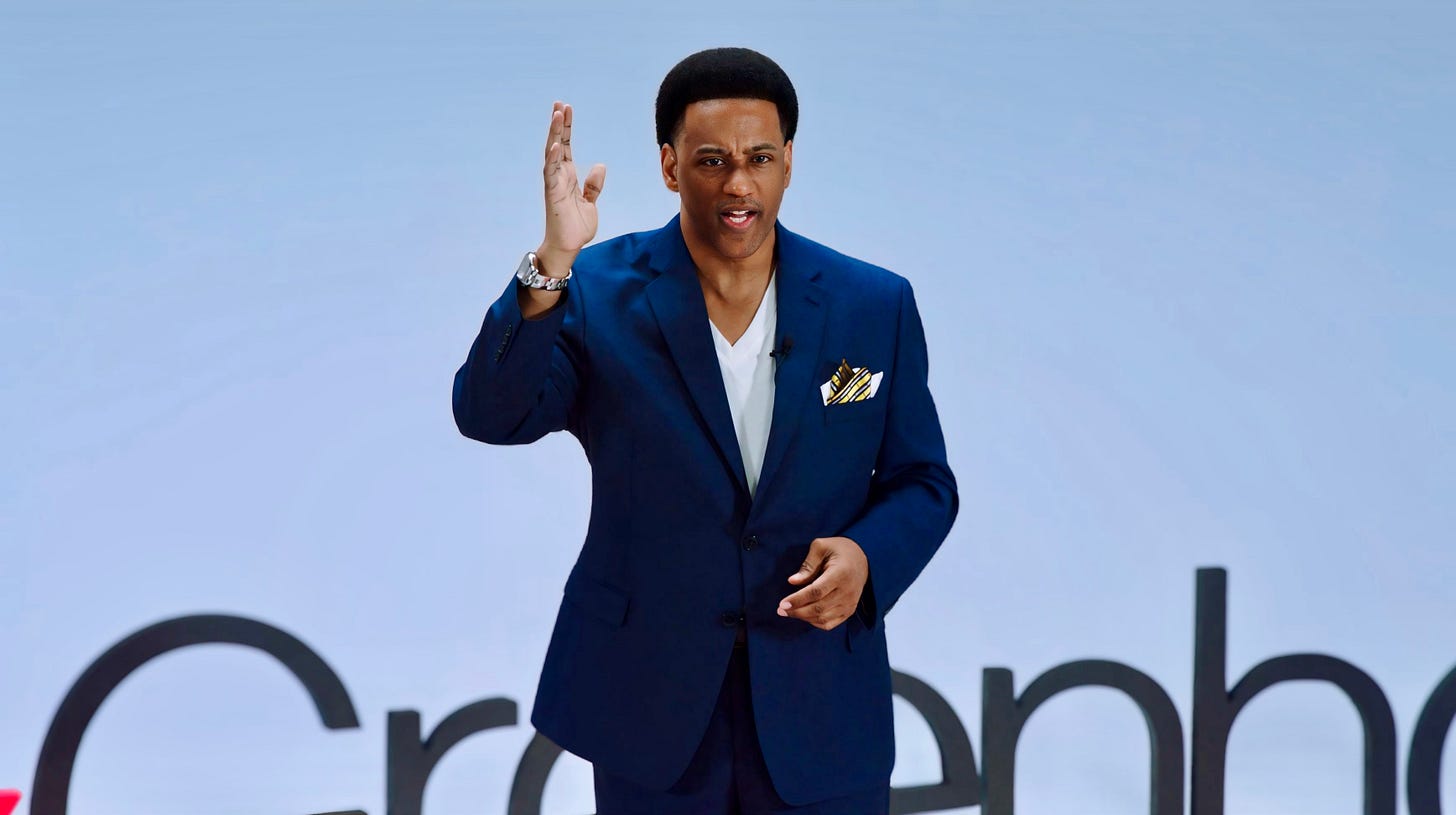The 'Real Shame' from Leadership Errors
A illuminating leadership conclusion reached after falling into a glacier crevasse
Our most alarming professional errors, near disasters or worse — our nightmares— are unwise to bury and never to talk about again. However, that’s what humans often do, to the detriment of ourselves and maybe, other people.
“I myself didn't tell anyone for years. I was so ashamed of this incident..."
Those were the words of Monte Montepare, a wilderness and adventure guide and now part owner at Kennicott Wilderness Guides, champion storyteller and comedian.
He remembers and humorously tells the story of a life-and-near death experience when he was 23 years old and working as a glacier guide.
Montepare was supremely confident in the expertise he had developed and like most people in leadership or life, he didn’t want to discuss a failed decision when his leadership had to be immediately questioned, with people in his care being left to seriously wonder about his competency.
We don’t want to feel badly about ourselves in areas were we feel or know we are smart and accomplished in our professional work. What, though, if our silence, dismissiveness, denial or defensiveness is preventing some "profit" from it?
Montepare’s story is an attention-getting one. He was taking some people out for an adventure on a glacier after condescendingly judging them for their carefree attitude and showing up in top-of-the-line, expensive, brand new jackets despite likely having no experience in the wilderness.
He wasn’t feeling humble at the time. He was judgmental.
While he was the professional responsible for leading them, despite attempting to be careful and responsible, he fell through the snow and plunged into a narrow crevasse, with only "old snow" between him and sure death.
The people he was leading helped save him by tying their estimated $3,000 worth of outdoor jackets together to assist in their rescue. Afterward, they were kind and shocked he was able to get out of the crevasse.
Understandably, he was embarrassed and worse, experienced immense shame.
Montepare’s Eventual, Powerful Realization
"Because the truth is,” he said, “we all do make mistakes and the real shame is not being able to admit them and share them with others, so that we can all learn."
It can be painful to say "I'm sorry" and admit where not only didn’t we deliver on expectations — but our decisions, the outcomes and optics of them resulted in us coming across as less than credible and trustworthy.
That’s mentally difficult to accept. When we grip tightly to self protection of our ego and what we believe to be our safety, it can be costly in multiple ways in our relationships with our teams.
Working diligently to prevent this from happening is a critical task.
“Trust is an assessment for every situation,” says Rodney Lawson, a professional speaker and leadership expert with 23-plus years as a corporate executive. “It is the one element where human interaction can exist at it’s highest form in building, creating and uniting.”
He elaborates to illustrate.
”We must trust our pilots before flight and we must trust our banks with our money. When our employees trust us with their direction, they perform at much higher levels,” Lawson says. “Not admitting a simple mistake can erode trust.
“If we want the highest commitment in our business relationships, it starts with building and maintaining trust.”
A leader has the same emotions as the people with whom they are entrusted to show the way. A greater responsibility exists. Connection is paramount to success.
“Ego is a barrier to growth: when we don’t recognize and admit our mistakes, we create distance between ourselves and others, which damages relationships,” asserts Dee DeRidder, the founder at MissFit Coaching, where she helps job seekers in different countries land and negotiate jobs.
“The inability to say ‘I am sorry’ is about insecurity and selfishness. Achieving perfection and thereby winning the admiration of all, is a myth,” she adds. “People relate to vulnerability and authenticity. A great way to start is ‘I was wrong.’”
“I don’t see this as simply a choice between admitting our errors or covering them up,” says Iqbal Ahmad, the director at the Britannia School of Academics, a training provider company.
“I see this as a choice between admitting our errors in order to ensure learning, as well as building rapport and trust with the other person or people — or looking unprofessional and sacrificing our rapport and trust in order to protect a false ego.”
Having this philosophy and practice as a commitment can make a more welcomed path to necessary communication in difficult moments.
“This mindset makes it much easier to be upfront and transparent about our lapses, and almost always, without exception, my clients and subordinates respect me for this display of integrity and professionalism,” Ahmad says from experience.
“Admitting our errors helps us build closer connections with clients and subordinates, as they can relate to the vulnerability of making mistakes and will be much more open to discussing their experiences, weaknesses, mistakes or even fears, in order to find solutions or explore ways to collaborate more effectively.”

There can be long-term costs of being overly self protective about professional errors.
“I have witnessed it,” Lawson says. “No one trusted this person and the situation worsened over time until the company saw fit to remove the executive.”
It wasn’t just that leader who sustained damage.
“I saw performance decline, attrition increase, employee engagement decrease to new lows and his peers lost respect (for him),” Lawson says.
The costs can escalate, DeRidder points out.
“An error today snowballs over time,” she says. “Relationships with bosses, mentors and teammates erode. Authentic conversations that require trust start disappearing, and fear and distrust take over. We create toxicity at work. We become the emperor without any clothes.”
Observers in our circle notice what we’re doing, even if we believe they don’t.
“When we refuse to admit fault,” Ahmad says, “others are able to clearly see through our stubbornness and lack of integrity. We are unable to fool anyone for too long, so it makes much more sense to be open and honest about our mistakes.”
Otherwise, the costs will be needlessly attracted.
“This results in us losing important connections, including friends, who are unable to remain in a personal or professional relationship where there is no trust and (they believe) their views won’t be valued, despite being correct.”
This is More Helpful
“Self-awareness is a skill that doesn't come without intentionality,” DeRidder teaches. “When we slow down enough, we can feel in our heart that something is amiss. Perhaps it’s showing up as anger or fear. It bleeds into other areas of our lives.
“When we point the finger at others, pause and flip the finger to point to yourself. What’s this emotion? What’s the real reason behind the emotion” Am I reacting to the past or present?”
In short, when leaders err, it’s important to acknowledge it in the moment to their stakeholders and if valuable, moving forward.
“Pride can be extraordinarily expensive,” DeRidder says.
Values are a sound foundation to remember after poor decisions.
“Focusing on The 4 Essential Values: love, trust, honesty and respect for each other leads us to better, more impactful relationships,” Lawson says.
Leadership will not always get it “right.” At times, it may make awful decisions. What happens next and from that point on determines credibility, respect, trust and the levels to which be influential and persuasive.
“It helps everyone, including us, if we are open and transparent about our mistakes, as it will help us build a relationship of trust and mutual respect,” Ahmad says.
“It will help us build strong connections with others, cultivate a growth mindset and promote innovation and growth,” he adds, “as making mistakes is no longer treated as a terrible outcome, all of which will lead to positive outcomes for ourselves and those around us.”
This newsletter normally publishes Tuesday, Thursday and Sunday, with occasional articles on other days.
To advertise, sponsor a section of the newsletter or discuss your affiliate marketing program, contact CI.











Great story. Reminds me of something I had to learn along the way: Encourage reflection across the team. If other see your vulnerability, they’ll be more open about discussing their own missteps, which can drive innovation and improvement across the organization.
This was a really interesting story, and it goes to show how assumptions and biases can come back to bite you.